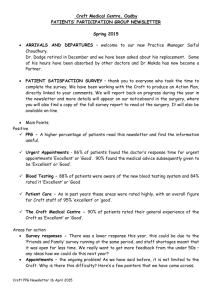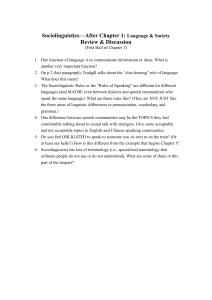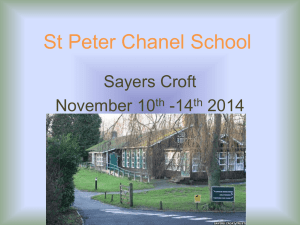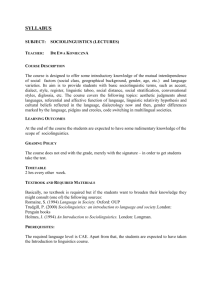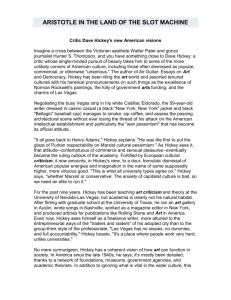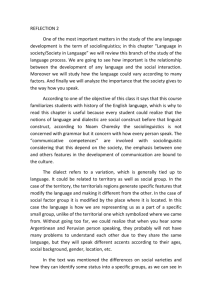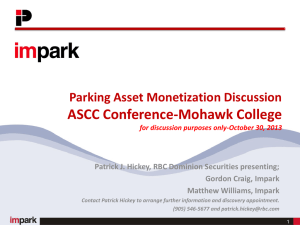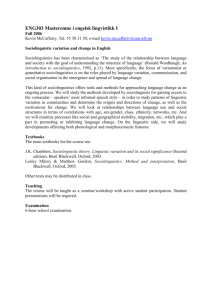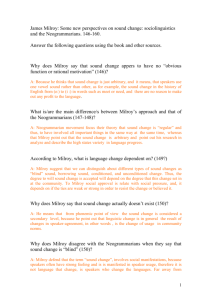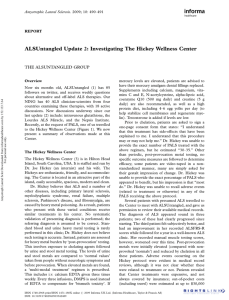Date
advertisement
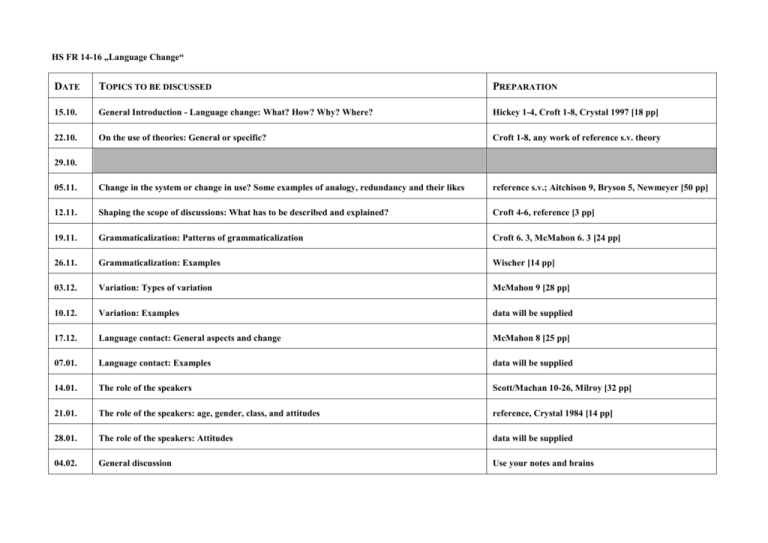
HS FR 14-16 „Language Change“ DATE TOPICS TO BE DISCUSSED PREPARATION 15.10. General Introduction - Language change: What? How? Why? Where? Hickey 1-4, Croft 1-8, Crystal 1997 [18 pp] 22.10. On the use of theories: General or specific? Croft 1-8, any work of reference s.v. theory 05.11. Change in the system or change in use? Some examples of analogy, redundancy and their likes reference s.v.; Aitchison 9, Bryson 5, Newmeyer [50 pp] 12.11. Shaping the scope of discussions: What has to be described and explained? Croft 4-6, reference [3 pp] 19.11. Grammaticalization: Patterns of grammaticalization Croft 6. 3, McMahon 6. 3 [24 pp] 26.11. Grammaticalization: Examples Wischer [14 pp] 03.12. Variation: Types of variation McMahon 9 [28 pp] 10.12. Variation: Examples data will be supplied 17.12. Language contact: General aspects and change McMahon 8 [25 pp] 07.01. Language contact: Examples data will be supplied 14.01. The role of the speakers Scott/Machan 10-26, Milroy [32 pp] 21.01. The role of the speakers: age, gender, class, and attitudes reference, Crystal 1984 [14 pp] 28.01. The role of the speakers: Attitudes data will be supplied 04.02. General discussion Use your notes and brains 29.10. Reading list: Aitchison Jean Aitchison. Language change : progress or decay ? 2nd ed. Cambridge 1991 [chapter 9 “Doing what comes naturally: inherent causes of language change” pp. 124-137]. Bryson Bill Bryson. the mother tongue: english and how it got that way. New York 1990 [chapter 5 “Where words come from” pp. 67-83]. Croft William Croft. Explaining language change. Longman Linguistic Library. Harlow 2000 [chapters 1 “Introduction” pp. 1-8, 6.3 “Grammaticalization” pp. 156-165]. Crystal 1984 David Crystal. Who cares about English usage? Harmondsworth 1984 [chapter “What has sex got to do with it?” pp. 99-112]. Crystal 1997 -----. The Cambridge encyclopedia of language. 2nd ed. Cambridge 1997 [chapter 54 “Language change” pp. 330-335]. Hickey Raymon Hickey (ed.). Motives for language change. Cambridge 2003 [“Introduction” pp. 1-4, Milroy pp. 143-157, Newmeyer pp. 18-36]. Machan/Scott Tim William Machan and Charles T. Scott (eds.). English in its social contexts: essays in historical sociolinguistics. Oxford Studies in Sociolinguistics. Oxford 1992 [“Introduction: Sociolinguistics, language change, and the history of English” pp. 3-27]. McMahon April M.S. Mc;ahon. Understanding language change. Cambridge 1994 [chapters 6.3 “”Grammaticalisation” pp. 160-173, 8 “Language contact” pp. 200-224, 9 “Linguistic variation” pp. 225-252]. Milroy James Milroy. “On the role of the speaker in language change”, in Hickey 2003:143-157. Newmeyer Frederick J. Newmeyer. “Formal and functional motivation for language change”, in Hickey 2003:18-36. Wischer Ilse Wischer. "Sprachkontakt und Grammatikalisierung - Zum Einfluß des Altnordischen auf die Entwicklung der englischen Sprache", in Gerda Haßler (ed.), Sprachkontakt und Sprachvergleich, Münster 2001, pp. 75-88. (UB: spr u 300.h 355; vormerken lassen!) Attention Though the reading amount is some 210 pages of differing size and difficulty, each participant must make a serious effort to come to grips with the secondary literature. I therefore expect ALL of you to be able to explain the theses proposed in them, and to justify or criticize these theses by referring them to the basic arguments used in the respective articles. The ability to do so will be checked in seminar, by the RANDOM choice of participants who will be asked to introduce the seminar to the contributions to be discussed, AT THE BEGINNING OF THE MEETING; this will be part of your Leistungsnachweis.
